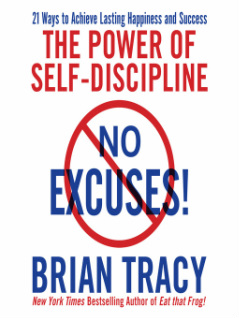Each of the 21 chapters in this book shows you how to be more disciplined in one aspect of your life, with end-of-chapter exercises to help you apply the "no excuses" approach to your own life. With these guidelines, you can learn how to be more successful in everything you do--instead of wistfully envying others you think are just "luckier" than you. A little self-discipline goes a long way…so stop making excuses and read this book!
Humble Beginnings
One quality that most philosophers, teachers, and experts agree on is the importance of self-discipline. Discipline is what you must have to resist the lure of excuses. It is the key to a great life and, without it, no lasting success is possible. You can achieve almost any goal you set for yourself if you have the discipline to pay the price, to do what you need to do, and to never give up.
Who Should Read This Book?
This book is written for ambitious, determined men and women who want to achieve everything that is possible for them in life. It is written for people who are ‘hungry’ to do more, to have more, and to be more than they ever have been before. The most important insight of all with regard to success is that to achieve greatly, you must become a different person. It is not the material things you accomplish or acquire that matter so much as it is the quality of the person you must become to accomplish well above the average. The development of self-discipline is the high road that makes everything possible for you.
The Reason for Success
The most important success principle of all was stated by Elbert Hubbard, one of the most prolific writers in American history, at the beginning of the twentieth century. He said, “Self-discipline is the ability to do what you should do, when you should do it, whether you feel like it or not.” Self-discipline is the key to personal greatness. It is the magic quality that opens all doors for you and makes everything else possible. With self-discipline, the average person can rise as far and as fast as his talents and intelligence can take him. But without self-discipline, a person with every blessing of background, education, and opportunity will seldom rise above mediocrity.
Your Two Worst Enemies
Just as self-discipline is the key to success, the lack of self-discipline is the major cause of failure, frustration, under-achievement, and unhappiness in life. It causes us to make excuses and sell ourselves short. The two biggest enemies of success, happiness and personal fulfillment, are first the Path of Least Resistance, and second, the Expediency Factor. The Path of Least Resistance is what causes people to take the easy way out in almost every situation. The Expediency Factor says, “People invariably seek the fastest and easiest way to get the things they want, right now, with little or no concern for the long-term consequences of their behaviors.” In other words, most people do what is expedient, what is fun and easy rather than what is necessary for success.
Think Long Term
The most important single attribute of people who achieved great success in life was “long time perspective.” The most successful people are long-term thinkers. They look into the future as far as they can to determine the kind of people they want to become and the goals they want to achieve. They then come back to the present and determine the things that they will have to do – or not do – to achieve their desired futures.
The Common Denominator of Success
The common denominator of success is that ‘successful people’ make a habit of doing the things that unsuccessful people don’t like to do. It turned out that the things that successful people don’t like to do are the same things that failures don’t like to do either. But successful people do them anyway because they know that this is the price they have to pay if they want to enjoy greater success and rewards in the future.
The Habit of Self-Discipline
To develop the habit of self-discipline, you first make a firm decision about how you will behave in a particular area of activity. You then refuse to allow exceptions until the habit of self-discipline in that area is firmly established. Each time you slip, as you will, you resolve once again to keep practicing self-discipline until it becomes easier for you to behave in a disciplined way than to behave in an undisciplined way.
The Big Payoff
There is a direct relationship between self-discipline and self-esteem:
- The more you practice self-mastery and self-control, the more you like and value yourself;
- The more you discipline yourself, the greater is your sense of self-respect and personal pride;
- The more you practice self-discipline; the better is your self-image. You see yourself and think about yourself in a more positive way. You feel happier and more powerful as a person.
Self-discipline is the key to self-esteem, self-respect, and personal pride. The development of self-discipline is your guarantee that you will eventually overcome all your obstacles and create a wonderful life for yourself.
I subscribe to the idea that things get better when we get better. Dee Hock, founder and former CEO of Visa advocated investing the biggest portion of your time (at least 40%) to managing yourself. That means investing in the development of YOU. No Excuses! is an investment that should be made by everyone who wants to achieve a little more in life.
No Excuses! The Power of Self-Discipline by Brian Tracy



 RSS Feed
RSS Feed